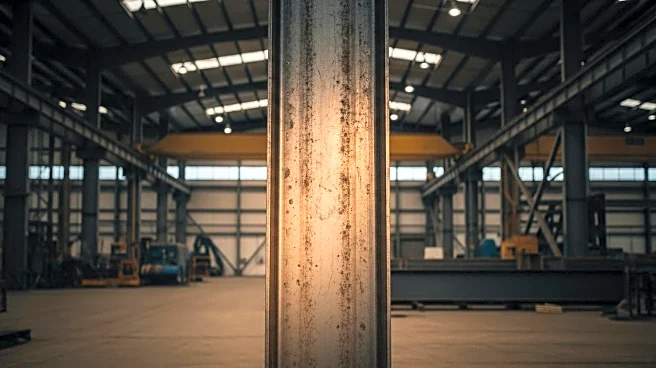What's Happening?
The Ajaokuta Steel Complex in Kogi State, Nigeria, has been a long-standing project aimed at boosting the country's industrialization through integrated steel production. Initiated in the 1970s with Soviet assistance, the complex was designed to encompass iron ore mining, coke ovens, blast furnaces, and rolling mills. Despite significant progress by the early 1980s, critical components such as the blast furnace and coke ovens remain nonfunctional. Over the decades, the project has been plagued by policy inconsistency, underfunding, contract issues, and technical gaps. Concession agreements with private firms have often failed, leading to allegations of asset stripping and poor performance. The Nigerian government recently settled claims with Global Steel Holdings to regain control, but the complex still struggles to achieve full operational status.
Why It's Important?
The Ajaokuta Steel Complex represents a significant missed opportunity for Nigeria's industrial sector. Its failure to become fully operational has hindered the country's ability to produce steel domestically, impacting economic growth and industrial development. The project's challenges highlight broader issues such as political instability, corruption, and inadequate infrastructure, which continue to affect large-scale industrial projects in Nigeria. Reviving the complex could provide substantial economic benefits, including job creation and reduced reliance on steel imports. However, addressing past flaws and ensuring consistent political commitment are crucial for its success.
What's Next?
Efforts to revive the Ajaokuta Steel Complex are ongoing, with recent initiatives involving foreign partners and plans for new investments. Stakeholders express cautious optimism, but emphasize the need to address policy inconsistency, corruption, and infrastructural gaps. The Nigerian government must ensure that supporting infrastructure such as power and transport is in place to facilitate the complex's operations. Additionally, well-designed contracts with enforceable performance metrics are essential to prevent past failures. The success of these efforts will depend on sustained political will and effective management.
Beyond the Headlines
The Ajaokuta Steel Complex serves as a cautionary tale for large industrial projects in developing countries. It underscores the importance of continuous political commitment, robust infrastructure, and transparent contracting processes. The project's challenges also reflect broader systemic issues in Nigeria, such as corruption and mismanagement, which can undermine economic development. Addressing these issues is crucial not only for the complex's revival but also for the country's overall industrialization efforts.








